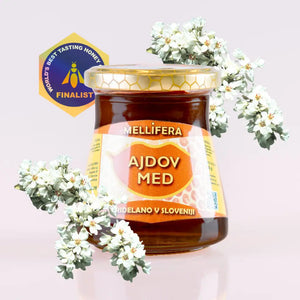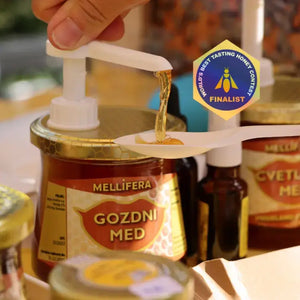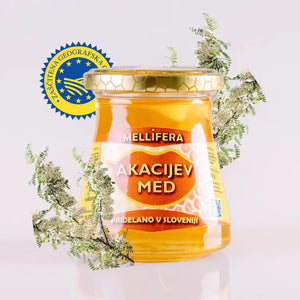
🐝 Mellifera blog • Properties of honey
8 properties of honey you need to know
Honey is not just a sweetener. It is a natural product with character and tradition. In this guide, you'll briefly discover how it's made, why the types differ, and how to choose the one that really suits you.
Note: The text is for informational purposes only and does not replace medical advice.
How is it formed between • Why are honeys different ? Eight features • How to choose quality honey • How to incorporate honey into your daily routine • Which type to choose • Recipe ideas • Storage and shelf life • Frequently asked questions
- Honey is made from nectar or honeydew with the help of bees.
- The color and taste depend on the origin of the pasture.
- Crystallization is a natural phenomenon and a sign of authenticity.
- The ratio of fructose to glucose determines the texture.
- Darker honeys often bring a more pronounced profile.
How is honey made?
Bees collect nectar and manna, carry it to the hive and convert it into honey with the help of enzymes and aeration. When the water content is low enough, they seal the cell with a wax cap. This creates a stable and aromatic product that bears the signature of the landscape and pastures.
At Mellifera you can find: flower honey , acacia honey , forest honey, buckwheat honey, honeydew honey, linden honey and chestnut honey .

Why are honeys different?
Botanical origin and climate are decisive. The ratio of fructose to glucose is also important. Darker profiles often bring more pronounced notes and more naturally occurring polyphenols. Lighter ones are more delicate and tend to crystallize more slowly.
Eight properties of honey that are good to know
1) A rich range of aromas
Honey has natural enzymes, organic acids and aromatic compounds. From delicate acacia to distinctive buckwheat . Choose the one that matches your moment.

2) Color says a lot
Darker honeys, such as forest and buckwheat , tend to contain more naturally occurring polyphenols. This affects the color and aroma.
3) Crystallization is natural
Crystallization is a normal sign of authenticity. To restore the liquid texture, place the jar briefly in a warm water bath at 40°C and stir.
4) Texture comes from the ratio of sugars
A higher fructose content means a longer liquid phase. A higher glucose content results in faster crystallization and a more spreadable structure.
5) Trace minerals
Honey naturally contains minerals like potassium, magnesium, and zinc, and darker varieties often stand out for this as well.
6) Great in the kitchen
Forest honey beautifully rounds out marinades and baked dishes. Buckwheat shines in chocolate desserts. Acacia is a gentle choice for tea and yogurt.
7) Hot drinks remain a classic
A teaspoon of honey in a warm drink provides a pleasant sensation in the throat and a richer aroma. The drink should not be too hot so that the properties remain as unchanged as possible.
8) No unnecessary accessories
Our honeys have no added colorings or flavors. We make sure that the honey is not heated above 40 °C and is not filtered. This way, it remains as close to nature as possible.
How to choose quality honey
- Origin and traceability Choose a verified and clear origin.
- Marks and labels Look at the batch, expiration date, and type.
- Sensory profile Choose based on color, aroma, and taste.
- Crystallization A natural phenomenon that speaks in favor of authenticity.
How to incorporate honey into your daily routine
- In the morning in lukewarm water or lemonade.
- In tea or warm milk before bed.
- As a spread or topping for yogurt, cereal and fruit.
- In recipes instead of sugar when you also want a flavorful signature.
- In marinades and dressings for vegetables or meat.
Which type to choose
Below you will find a quick guide. On mobile devices there are always two options in a row.




